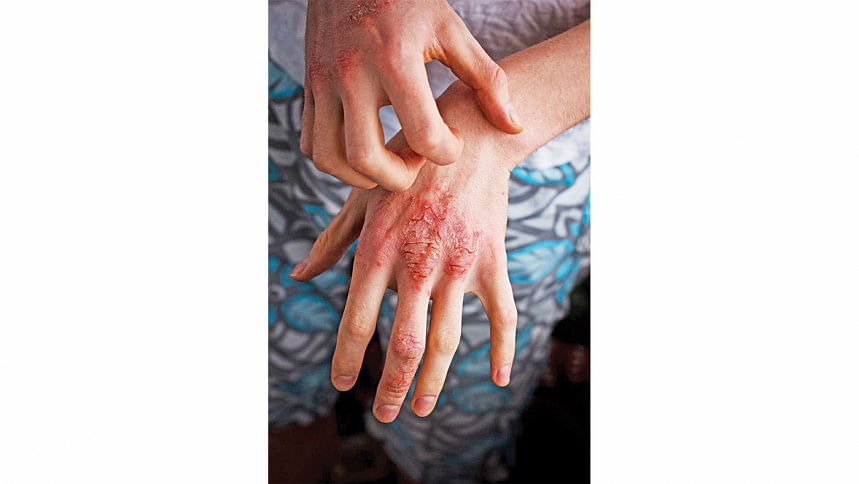What to do when your eczema itches?

Atopic dermatitis (AD) can be a long-lasting condition that causes severe, itchy rashes. At times, you may feel like you cannot stop scratching, which can lead to other problems.
With scratching, breaks in the skin can also get infected, causing impetigo, blisters, and swelling. These blisters can ooze fluid or crust over time, causing rough areas and scabs on the skin.
Here is what you can do to help your skin heal and try to prevent infections. When your skin is damaged or broken:
Try not to scratch: Some people scratch so much they bleed, and that is a setup for infection. Instead of scratching with your nails, try to press the area with your fingertips. Keeping your nails short will help. You can also try to cover your inflamed skin. You may be less tempted to scratch if you cannot see it.
Mirror scratching: Try this when the itch is on just one side of your body. It may sound like a magic trick, but it is more than an optical illusion. Say your left arm itches. Look into a mirror and focus on your reflection's left arm, which is actually your right. Scratch there as you watch, and your brain gets the message that your eczema itch was taken care of.
Moisturise your skin: Damages skin has a hard time holding onto water. Applying a thick emollient multiple times a day can protect and soothe cracked skin while sealing in moisture. Greasy ointments like mineral oil and petroleum jelly often work best, but find a product that you like. You may need to try a couple to see which brands help your skin the most.
Oils from the pantry: One study found that sunflower seed oil does more to soften skin than a popular cream -- and it is a lot cheaper. Coconut oil nourishes and helps lessen inflammation. Look for the word "virgin" on the label: That means it was processed without losing its natural healing properties. As good as olive oil is for cooking, though, it is a no-go for your itchy skin.
Soak in an oatmeal bath: Colloidal oatmeal (finely ground oatmeal) has special compounds that can help strengthen your skin barrier. Add the oatmeal to a lukewarm -- not hot -- bath and soak for 10 to 15 minutes. When you get out, gently pat your skin dry and apply moisturiser right away.
Apply wet wraps: During a severe flare, a wet wrap can soothe inflamed skin and help lock in moisture. Dampen a clean gauze or a cotton cloth with warm water, then gently press it onto your skin. Cover it with a layer of dry cloth or gauze. For best results, keep the wraps in place for several hours or overnight. Try not to let them dry out.
Take allergy meds: When your itching is intense, an over-the-counter antihistamine can give short-term relief.
Topicals: Menthol has a cooling effect that cancels out itch, but higher than a 1%-3% concentration could irritate. Store your topicals in the fridge.
Know when to ask for more help. Call your doctor if your:
• Condition gets in the way of your daily routine or keeps you from sleeping.
• Skin shows signs of an infection (like pus, red streaks, or yellow scabs).
• AD does not improve even after you try different home remedies.
• AD is severe or covers a lot of your body.

 For all latest news, follow The Daily Star's Google News channel.
For all latest news, follow The Daily Star's Google News channel. 



Comments